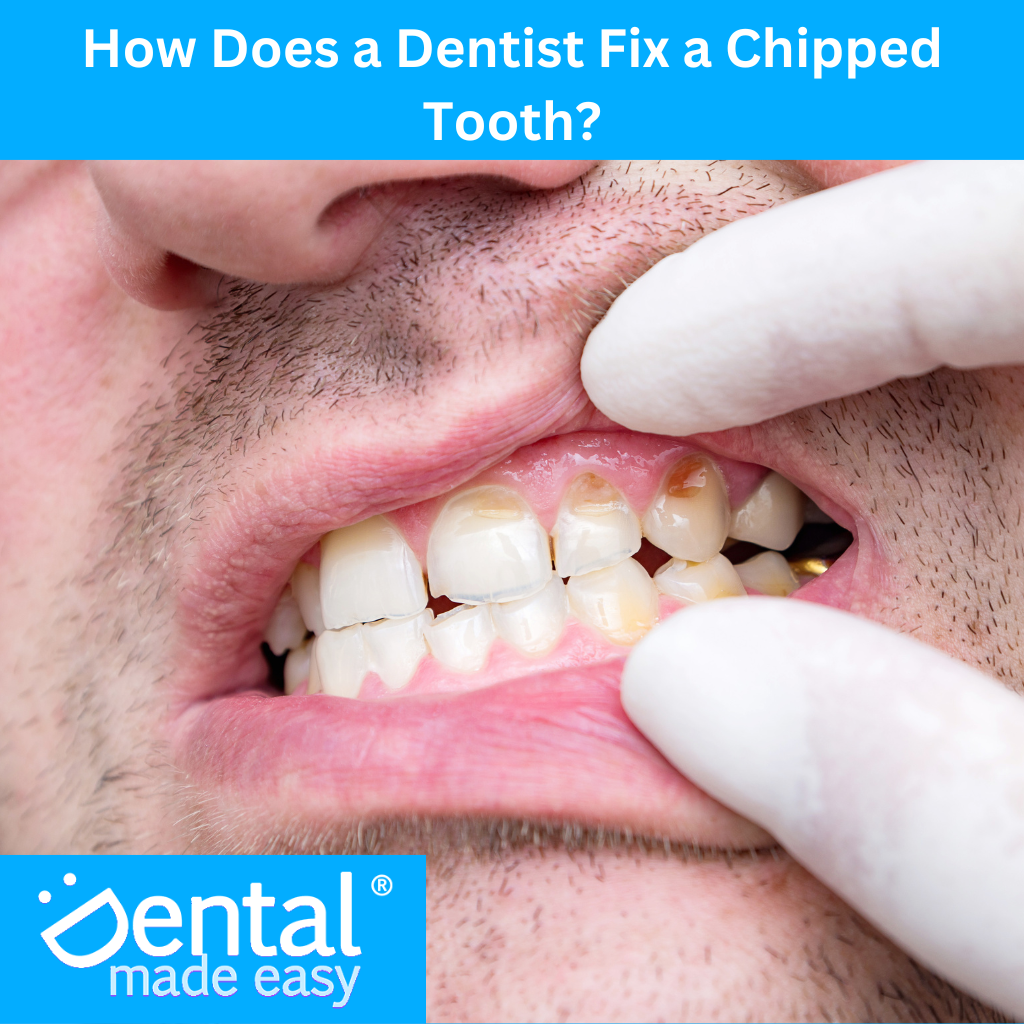A chipped tooth is a common dental issue that can be both unsightly and potentially painful.
Whether it’s the result of an accidental fall, biting into something hard, or other trauma, a chipped tooth can cause discomfort and self-esteem concerns. Fortunately, modern dentistry offers a variety of effective solutions for repairing chipped teeth.
In this blog post, we’ll explore the different techniques and procedures that dentists use to fix a chipped tooth.
Understanding the Anatomy of a Tooth
Before delving into the ways a dentist can repair a chipped tooth, it’s important to have a basic understanding of tooth anatomy. A tooth has several layers:
- Enamel: The outermost layer of the tooth, enamel is the hardest and most mineralized substance in the human body. It provides protection to the underlying tooth structures.
- Dentin: Beneath the enamel lies dentin, a yellowish tissue that makes up the bulk of the tooth’s structure. Despite not being as hard as enamel, Dentin is still quite durable.
- Pulp: The pulp is the innermost part of the tooth, containing nerves, blood vessels, and connective tissue. It takes care of nourishing the tooth and transmitting sensory information.
When a tooth is chipped, the extent of the damage will vary. It can range from a minor cosmetic issue to more severe damage that exposes the dentin or even reaches the pulp. The method of repair employed by a dentist will depend on the severity of the chipped tooth.
Fixing a Minor Chip
For minor chips, where only the enamel is affected, the dentist may use one of the following techniques:
- Dental Bonding: Dental bonding is a minimally invasive and cost-effective way to repair a minor chip. The dentist will apply a tooth-colored resin to the chipped area, sculpt it to match the natural tooth shape, and then cure it using a special light. The result is a seamless repair that restores the tooth’s appearance.
- Porcelain Veneers: Veneers are thin shells made of porcelain that are custom-crafted to fit over the front surface of a tooth. They are an excellent option for addressing minor chips, as they can also improve the tooth’s color and shape. Veneers are a more permanent solution compared to dental bonding.
- Dental Contouring: In some cases, the dentist may use dental contouring to smooth out minor chips. This involves removing a small amount of enamel to reshape the tooth and eliminate rough edges. The procedure is quick and painless.
Addressing Moderate Chips
When the chip is more substantial and involves damage to both the enamel and dentin, the dentist may recommend the following treatments:
- Dental Crowns: Dental crowns are cap-like restorations that cover the entire visible portion of a damaged tooth. They are often used for moderate to severe chips and provide both cosmetic improvement and added strength to the tooth.
- Inlays and Onlays: Inlays and onlays are a middle-ground option between fillings and crowns. They are used to repair moderately chipped teeth by covering or filling the damaged area. Inlays fit inside the cusp tips of the tooth, while onlays extend over the cusp tips.
- Composite Fillings: In cases where a chip has caused a cavity, the dentist may use composite fillings. These fillings are made of tooth-colored resin and are an aesthetic alternative to traditional amalgam fillings.
Managing Severe Chips and Trauma
In situations where a tooth is severely chipped, with significant damage to the enamel and dentin, or when the pulp is exposed due to trauma, more extensive treatments may be necessary. This can include:
- Root Canal Therapy: When a chip exposes the pulp and causes pain or infection, a root canal procedure may be required. This involves removing the damaged pulp, cleaning the inside of the tooth, and sealing it to prevent further infection. After a root canal, the tooth may need a crown to restore its strength and appearance.
- Dental Implants: In cases where the chipped tooth cannot be salvaged, a dental implant may be the best solution. This involves surgically placing a titanium implant into the jawbone to replace the missing tooth. A prosthetic tooth is then attached to the implant, providing a long-term, natural-looking solution.
Choosing the Right Treatment
The choice of treatment for a chipped tooth depends on various factors, including the extent of the damage, the patient’s oral health, and their aesthetic preferences. Your dentist will evaluate your specific situation and recommend the most suitable option.
Preventing Future Chipped Teeth
While it’s essential to know how dentists can fix chipped teeth, it’s equally important to take steps to prevent chipping in the first place. Here are some tips to help prevent your teeth from chipping:
- Avoid chewing on hard objects such as ice, pens, or fingernails.
- Wear a mouthguard during sports or other activities with a risk of dental injury.
- Be cautious with food that can be hard on teeth, like popcorn kernels and hard candies.
- Maintain good oral hygiene to keep your teeth strong and healthy.
A chipped tooth can happen to anyone, but the good news is that modern dentistry offers various effective solutions for repairing and restoring your smile.
The treatment your dentist recommends will depend on the severity of the chip and your individual needs. Whether it’s a simple bonding procedure or a more complex crown or implant, dentists have the tools and expertise to ensure your chipped tooth is fixed, and your smile is as good as new. Remember, prevention is key, so take care of your oral health to reduce the risk of future chipped teeth.
If you would like to make an appointment with Dental Made Easy please contact one of our locations below:







